(完整word版)should用法归纳与练习had better
Had better
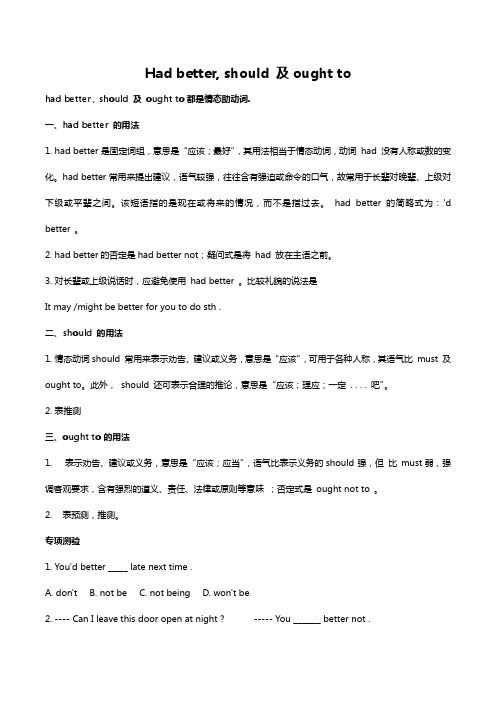
Had better, should 及ought tohad better , should 及ought to都是情态助动词.一、had better 的用法1.had better 是固定词组,意思是“应该;最好”,其用法相当于情态动词,动词had 没有人称或数的变化。
had better 常用来提出建议,语气较强,往往含有强迫或命令的口气,故常用于长辈对晚辈、上级对下级或平辈之间。
该短语指的是现在或将来的情况,而不是指过去。
had better的简略式为:'d better 。
2.had better的否定是had better not;疑问式是将had 放在主语之前。
3.对长辈或上级说话时,应避免使用had better 。
比较礼貌的说法是It may /might be better for you to do sth .二、should 的用法1.情态动词should 常用来表示劝告、建议或义务,意思是“应该”,可用于各种人称,其语气比must 及ought to。
此外,should 还可表示合理的推论,意思是“应该;理应;一定 . . . . 吧”。
2.表推测三、ought to 的用法1.表示劝告、建议或义务,意思是“应该;应当”,语气比表示义务的 should强,但比must 弱,强调客观要求,含有强烈的道义、责任、法律或原则等意味;否定式是ought not to 。
2.表预测,推测。
专项测验1.You'd better _____ late next time .A. don'tB. not beC. not beingD. won't be2.---- Can I leave this door open at night ? ----- You _______ better not .A.shouldB. wouldC. couldD. had3.----- I'm afraid I've got a bad cold . ---- _______ .A.Keep away fromB. Never mindC. You need medicineD. Better go and see a doctor4.You _____ smoke while you are walking around in the woods here. You __ start a fire .A.shouldn't ; mustB. can't ; shouldn'tC. can't ; may notD. mustn't ; could5. ---- Will you please go to the cinema with me tonight ?------Sorry ._________ , but I have some papers to finish .A.I should love itB. I should love toC. I would likeD. I had better not6.You are their teacher. You ______ care of them .A.should to takeB. might to takeC. ought to takeD. need take7.---- ______ we to make a careful plan before we start the work ?---- Oh ,no . I don't think you _____ to do that .A.Must ; needB. Need ; needC. ought ; mustD. ought ; need8.Li Ming didn't want to do that , but he _____ .A.need toB. ought toC. have toD. had to9.---- Has the train arrived ? ---- No , it ______ half an hour ago .A. ought to arriveB. ought to have arrivedC. might arriveD. might have arrived。
情态动词should、had better和may的用法
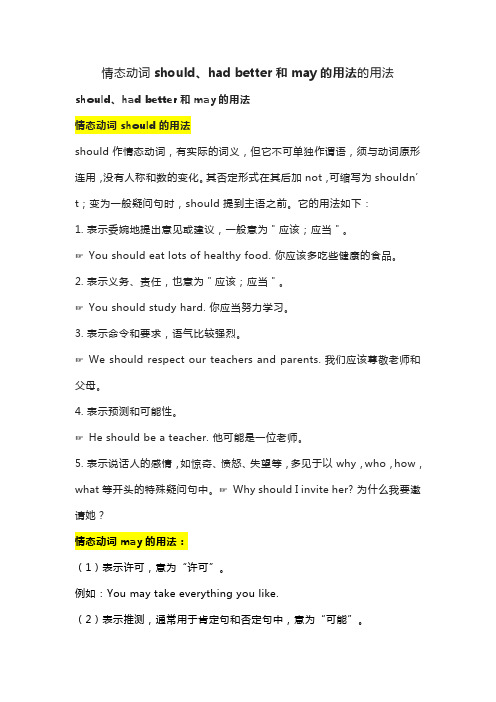
情态动词should、had better和may的用法的用法should、had better和may的用法情态动词should的用法should 作情态动词,有实际的词义,但它不可单独作谓语,须与动词原形连用,没有人称和数的变化。
其否定形式在其后加not,可缩写为shouldn’t;变为一般疑问句时,should 提到主语之前。
它的用法如下:1. 表示委婉地提出意见或建议,一般意为"应该;应当"。
☞ You should eat lots of healthy food. 你应该多吃些健康的食品。
2. 表示义务、责任,也意为"应该;应当"。
☞ You should study hard. 你应当努力学习。
3. 表示命令和要求,语气比较强烈。
☞ We should respect our teachers and parents. 我们应该尊敬老师和父母。
4. 表示预测和可能性。
☞ He should be a teacher. 他可能是一位老师。
5. 表示说话人的感情,如惊奇、愤怒、失望等,多见于以why,who,how,what等开头的特殊疑问句中。
☞ Why should I invite her? 为什么我要邀请她?情态动词may的用法:(1)表示许可,意为“许可”。
例如:You may take everything you like.(2)表示推测,通常用于肯定句和否定句中,意为“可能”。
例如:He may be very busy now.注意:can和may都不是可能性,can通常用于否定句和疑问句中,而may通常用于肯定句和否定句中。
虽然两者均可用于否定句中,但其意思不同:can't意为“不可能”,may not意为“可能不”。
另外,can和may均可表示请求允许,但can为一般用词,而may为正式用词。
had better的用法其意为“最好”、“应该”,后接动词原形,与情态动词should用法相似,其中的had通常缩略为 'd。
should用法归纳及练习
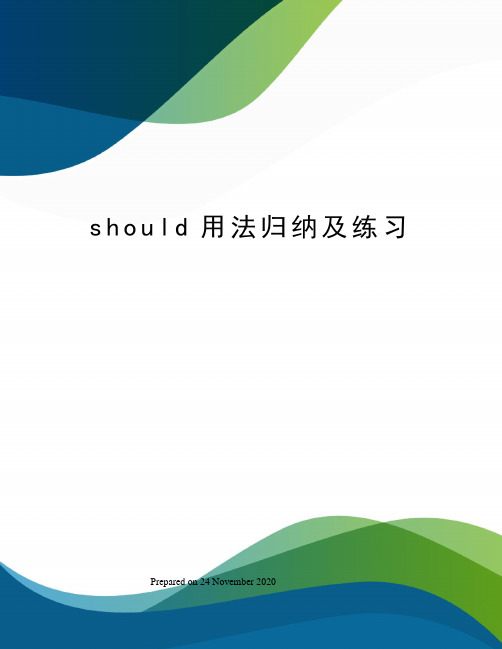
s h o u l d用法归纳及练习 Prepared on 24 November 2020should用法归纳及练习一、Should 表示过去将来时,即从过去观点看将来要发生的事,多用于间接引语中。
We thought that we should never see you again. 我们想我们再也看不到你了。
The BBC weather report this morning said that we should have rain.今天早上,BBC电台天气报告说,今天有雨。
二、Should 表示义务、责任、常译为“应当”,“应该”,或表示一种估计的情况,译成“按理应当”,“估计......”。
Why should I pay him 为什么我该付给他钱They should be there by now, I think. 我估计,他们现在到那儿了。
Should 用于完成时态,表示对过去发生的动作的一种推测,译成“应该已经......”。
You should have washed the wood. (But you haven‘t.) 你应该把伤口清洗了。
(然而你没有)三、在某些从句中,should 表示惊异、意外等情绪,常译为“竟然”。
It seems unfair that this should happen to me.真不公平,这件事竟然发生在我身上。
四、当陈述部分含有ought to ,其反意疑问句部分,美国英语中用should .She ought to stay here, shouldn't her她该留在这儿,是吗五、用于成语中I should like to......“我想(做)......”I should like to ask the teacher a question. 我想问老师一个问题。
六、"should (not) +have+过去分词(done)" 对已发生的事表示遗憾或责备,表达"本该或不该"之意。
关于should的语法知识点
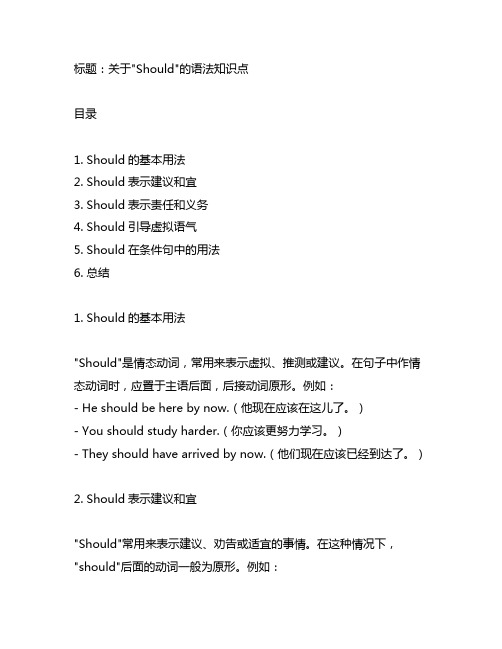
标题:关于"Should"的语法知识点目录1. Should的基本用法2. Should表示建议和宜3. Should表示责任和义务4. Should引导虚拟语气5. Should在条件句中的用法6. 总结1. Should的基本用法"Should"是情态动词,常用来表示虚拟、推测或建议。
在句子中作情态动词时,应置于主语后面,后接动词原形。
例如:- He should be here by now.(他现在应该在这儿了。
)- You should study harder.(你应该更努力学习。
)- They should have arrived by now.(他们现在应该已经到达了。
)2. Should表示建议和宜"Should"常用来表示建议、劝告或适宜的事情。
在这种情况下,"should"后面的动词一般为原形。
例如:- You should take a break.(你应该休息一下。
)- We should start early.(我们应该早点开始。
)- She should see a doctor.(她应该去看医生。
)3. Should表示责任和义务"Should"也可以表示责任和义务,通常用于表示某种道德上的义务或应尽的责任。
例如:- You should apologize for your mistake.(你应该为自己的错误道歉。
)- We should help those in need.(我们应该帮助有需要的人。
)- She should have returned the money.(她本应该把钱退还。
)4. Should引导虚拟语气在虚拟语气中,"should"常用来表示主观的推测或建议。
在这种情况下,"should"后面的动词一般为原形。
had better, should, ought to用法

had better, should, ought to用法had better, should, ought to是重要的情态动词,也是高考重要考点,学习时应注意下列几点:一、了解相互间关系had better(最好), should(应该)与ought to(应该)均为提建议、阐述观点的情态动词,其后接动词原形。
should 比had better语气强,ought to语气最强。
一般情况下should与ought to可通用。
例1:You had better go there at once.你最好立即去那里。
例2:You ought to / should work hard.你应该努力工作。
值得注意的是:should还有"竟然"之意,表出乎意料。
例:You can't imagine that a well-behaved gentleman should be so rude to a lady.你真是难以想象这么一个有风度的先生对一个女子是如此之粗鲁。
二、掌握句型变换方法had better, should, ought to作为情态动词,各种句型变换均在自身形式上作变化。
(一)否定句had better, should, ought to用于否定句时,否定词均位于其后,具体形式为:had better not do, shouldn't / should not do, oughtn't to do。
例1:You had better not start at this time.此时你最好别出发。
例2:He shouldn't be careless in class.他上课时不应粗心。
例3:She oughtn't to waste time.她不应该浪费时间。
(二)一般疑问句had better, should, ought to用于一般疑问句时,分别将had, should, ought提至句首。
should用法归纳与练习had better知识讲解

should用法归纳一、Should 表示义务、责任、常译为“应当”,“应该”,或表示一种估计的情况,译成“按理应当”,“估计......”。
Why should I pay him? 为什么我该付给他钱?They should be there by now,I think. 我估计,他们现在到那儿了。
二、用于成语中I should like to......“我想(做)......”I should like to ask the teacher a question. 我想问老师一个问题。
三、shouldn’t :不应该(表示责备);应该不,应该没有(表示推测)。
如:You shouldn't be so lazy.你不应该这么懒惰。
There shouldn't be any problem with your listening.你的听力应该没有问题了。
用should 或shouldn't 填空。
1. All of us ________study hard and learn English well.2. As a student, you_______ eat in class.3. You _______speak to your parents like this ,you must be polite (有礼貌)4. You __________eat less and take more exercise if want ot be healthier and stronger.5. My mother is very tired after work, I________ do some housework for her.had better(常简略为'd better)是一固定词组,had better"最好",用于表示对别人的劝告、建议或表示一种愿望。
(完整版)hadbetter,should,oughtto学习四要素
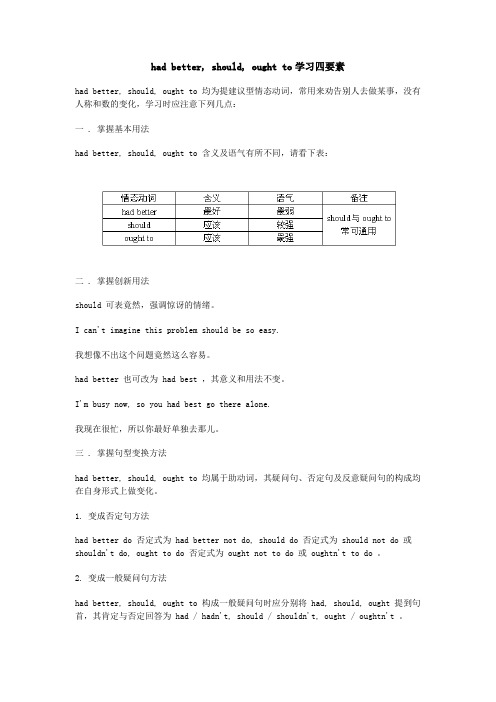
had better, should, ought to学习四要素had better, should, ought to 均为提建议型情态动词,常用来劝告别人去做某事,没有人称和数的变化,学习时应注意下列几点:一 . 掌握基本用法had better, should, ought to 含义及语气有所不同,请看下表:二 . 掌握创新用法should 可表竟然,强调惊讶的情绪。
I can't imagine this problem should be so easy.我想像不出这个问题竟然这么容易。
had better 也可改为 had best ,其意义和用法不变。
I'm busy now, so you had best go there alone.我现在很忙,所以你最好单独去那儿。
三 . 掌握句型变换方法had better, should, ought to 均属于助动词,其疑问句、否定句及反意疑问句的构成均在自身形式上做变化。
1. 变成否定句方法had better do 否定式为 had better not do, should do 否定式为 should not do 或shouldn't do, ought to do 否定式为 ought not to do 或 oughtn't to do 。
2. 变成一般疑问句方法had better, should, ought to 构成一般疑问句时应分别将 had, should, ought 提到句首,其肯定与否定回答为 had / hadn't, should / shouldn't, ought / oughtn't 。
3. 变成反意疑问句方法had better, should, ought to 构成反意疑问句时通常使用 had / hadn't, should / shouldn't, ought / oughtn't 形式。
全新语法情态动词的用法 九、had better
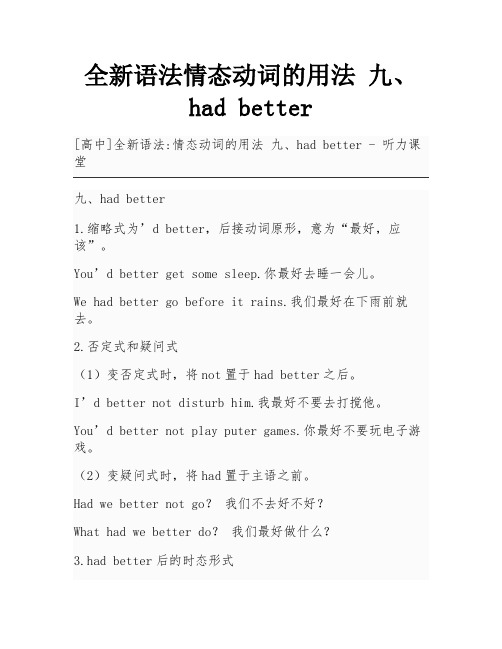
全新语法情态动词的用法九、had better[高中]全新语法:情态动词的用法九、had better - 听力课堂九、had better1.缩略式为’d better,后接动词原形,意为“最好,应该”。
You’d better get some sleep.你最好去睡一会儿。
We had better go before it rains.我们最好在下雨前就去。
2.否定式和疑问式(1)变否定式时,将not置于had better之后。
I’d better not disturb him.我最好不要去打搅他。
You’d better not play puter games.你最好不要玩电子游戏。
(2)变疑问式时,将had置于主语之前。
Had we better not go?我们不去好不好?What had we better do?我们最好做什么?3.had better后的时态形式You’d better be quiet.你最好安静一些。
(现在)You’d better start tomorrow.你最好明天动身。
(将来)I think I’d better be going.我想我最好还是马上走。
(马上做)You had better have stayed here.你本来应该呆在这儿的。
(过去该做但实际上没做)4.would rather(1)表示一种心理愿望,意为“宁愿”。
I’d rather do it by myself.我宁愿独自一人去做那件事。
I’d rather you came tomorrow.我倒想要你明天来。
I’d rather you had finished it yesterday.我倒想你昨天就做完了。
(2)否定形式:not置于rather之后。
I’d rather not say anything.我宁可什么也不说。
I’d rather not tell you about it.我倒想不告诉你为好。
- 1、下载文档前请自行甄别文档内容的完整性,平台不提供额外的编辑、内容补充、找答案等附加服务。
- 2、"仅部分预览"的文档,不可在线预览部分如存在完整性等问题,可反馈申请退款(可完整预览的文档不适用该条件!)。
- 3、如文档侵犯您的权益,请联系客服反馈,我们会尽快为您处理(人工客服工作时间:9:00-18:30)。
should用法归纳
一、Should 表示义务、责任、常译为“应当”,“应该”,或表示一种
估计的情况,译成“按理应当”,“估计......”。
Why should I pay him? 为什么我该付给他钱?
They should be there by now,I think. 我估计,他们现在到那儿了。
二、用于成语中I should like to......“我想(做)......”
I should like to ask the teacher a question. 我想问老师一个问题。
三、shouldn’t :不应该(表示责备);应该不,应该没有(表示推测)。
如:
You shouldn't be so lazy.你不应该这么懒惰。
There shouldn't be any problem with your listening.你的听力应该没有问题了。
用should 或shouldn't 填空。
1. All of us ________study hard and learn English well.
2. As a student, you_______ eat in class.
3. You _______speak to your parents like this ,you must be polite (有礼貌)
4. You __________eat less and take more exercise if want ot be healthier and stronger.
5. My mother is very tired after work, I________ do some housework for her.
had better(常简略为'd better)是一固定词组,had better"最好",用于表示对别人的劝告、建议或表示一种愿望。
其用法有以下几点:
一、had better后面必须跟动词原形。
had better后跟动词原形(即不带to的不定式),构成had better do sth.句型。
这里的had不能用have来替换。
如:
You'd better go to hospital at once.你最好立即去医院看病。
Tom, you'd better go there today.汤姆,你最好今天去那儿。
二、主语不论是第几人称,句子不论是什么时态,都要用had better 的形式。
如:
Now you(he,we) had better listen to the teacher.你(他,我们)现在最好听老师讲。
三、had better的否定式。
如:
常用的否定形式是将否定副词not直接放在had better的后面。
如:You had better not miss the last bus.你最好不要错过末班公
共汽车。
You had better not leave for Nanjing the day after tomorrow.你最好后天不要动身去南京。
注意:否定副词not绝不能放在had的后面。
如:不能说:You hadn't better go.而应该说:You had better not go.
四、在祈使句中,had有时可以省略。
如:
Better not do it .最好别做那事。
Better not wait for them.最好不要等他们。
五、had better在表示对别人劝告、建议时,不宜用于与陌生人、长辈及上级的交谈中。
对长辈说话时,最好不用had better。
比较有礼貌的说法是:It might be better for you...;
It would be better for you...。
如:
It might be better for you to help me,Grandpa.爷爷,您最好能帮我一下。
[练习]
下列各句都有一处错误,请改正。
1.You'd better to wait for me at the school gate.
2.I have better write to him now.
3.You had not better go there.。
